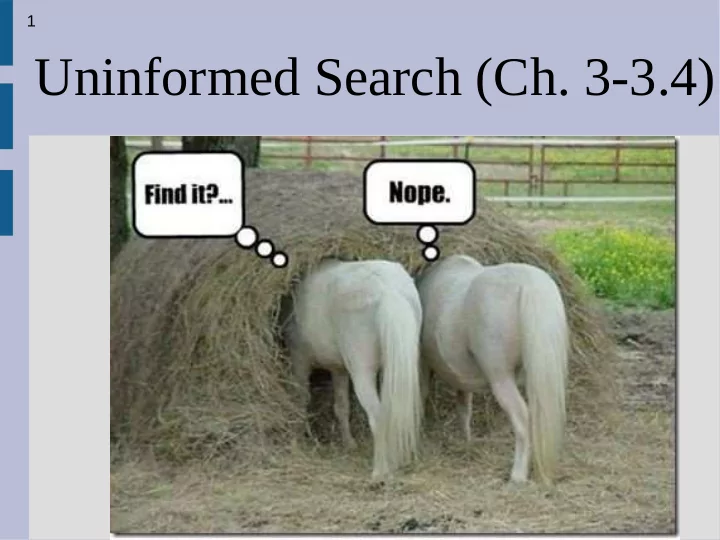

1 Uninformed Search (Ch. 3-3.4)
3 Breadth first search BFS can be implemented by using a simple FIFO (first in, first out) queue to track the fringe/frontier/unexplored nodes Metrics for BFS: Complete (i.e. guaranteed to find solution if exists) Non-optimal (unless uniform path cost) Time complexity = O(b d ) Space complexity = O(b d )
4 Uniform-cost search UCS is.. 1. Complete (if costs strictly greater than 0) 2. Optimal However.... 3&4. Time complexity = space complexity = O(b 1+C*/min(path cost) ), where C* cost of optimal solution (much worse than BFS)
5 Depth first search DFS is same as BFS except with a FILO (or LIFO) instead of a FIFO queue
6 Depth first search Metrics: 1. Might not terminate (not complete) (e.g. in vacuum world, if first expand is action L) 2. Non-optimal (just... no) 3. Time complexity = O(b m ) 4. Space complexity = O(b*m) Only way this is better than BFS is the space complexity...
7 Depth limited search DFS by itself is not great, but it has two (very) useful modifications Depth limited search runs normal DFS, but if it is at a specified depth limit, you cannot have children (i.e. take another action) Typically with a little more knowledge, you can create a reasonable limit and makes the algorithm correct
8 Depth limited search However, if you pick the depth limit before d, you will not find a solution (not correct, but will terminate)
9 Iterative deepening DFS Probably the most useful uninformed search is iterative deepening DFS This search performs depth limited search with maximum depth 1, then maximum depth 2, then 3... until it finds a solution
10 Iterative deepening DFS
11 Iterative deepening DFS The first few states do get re-checked multiple times in IDS, however it is not too many When you find the solution at depth d, depth 1 is expanded d times (at most b of them) The second depth are expanded d-1 times (at most b 2 of them) Thus
12 Iterative deepening DFS Metrics: 1. Complete 2. Non-optimal (unless uniform cost) 3. O(b d ) 4. O(b*d) Thus IDS is better in every way than BFS (asymptotically) One of the best uninformed searches
13 Bidirectional search Bidirectional search starts from both the goal and start (using BFS) until the trees meet This is better as 2*(b d/2 ) < b d (the space is much worse than IDS, so only applicable to smaller problems)
14 Bidirectional search
15 Uninformed search
Recommend
More recommend